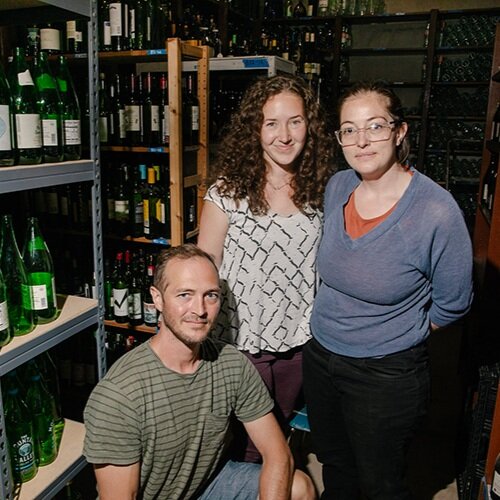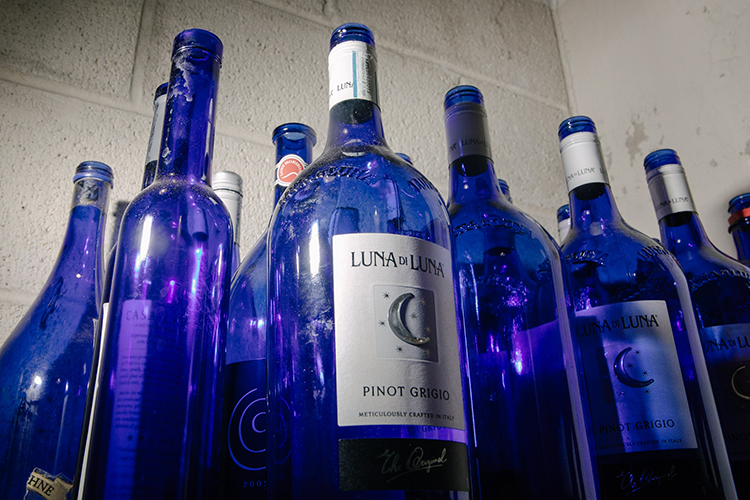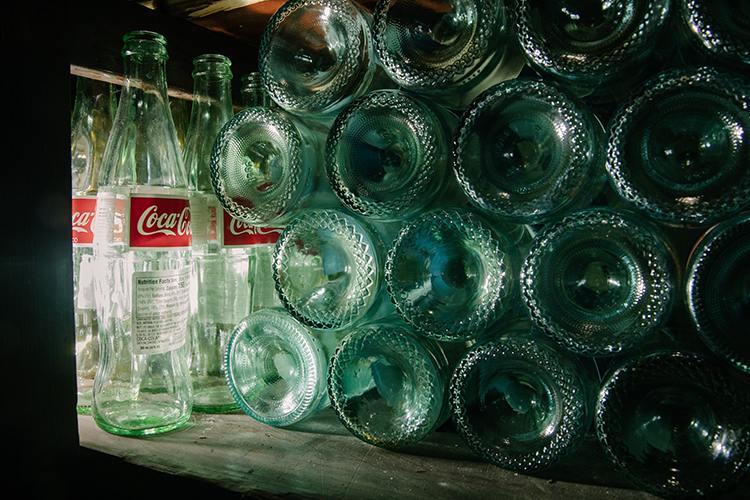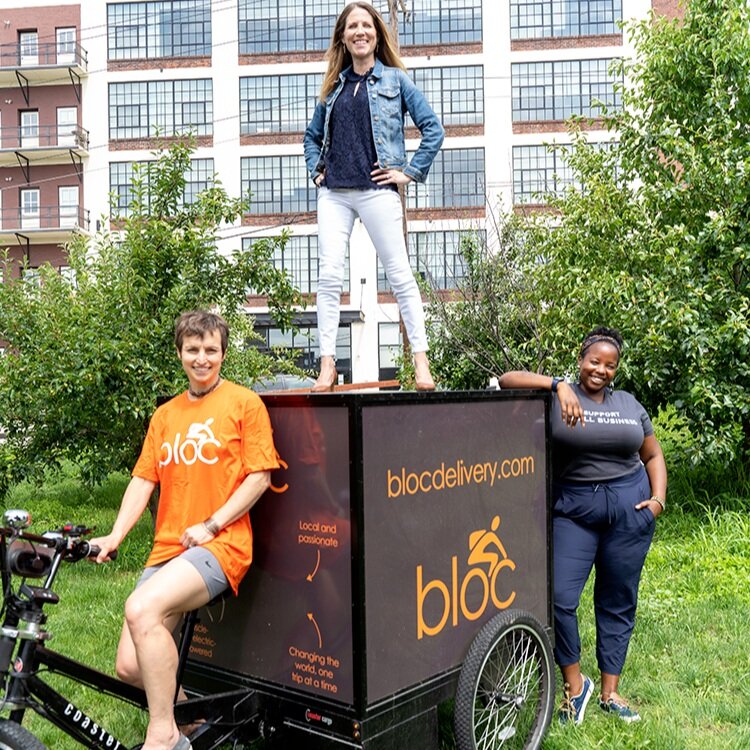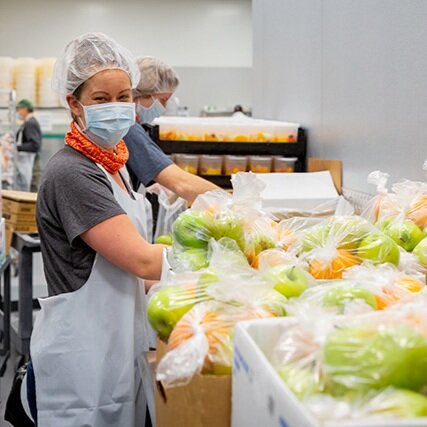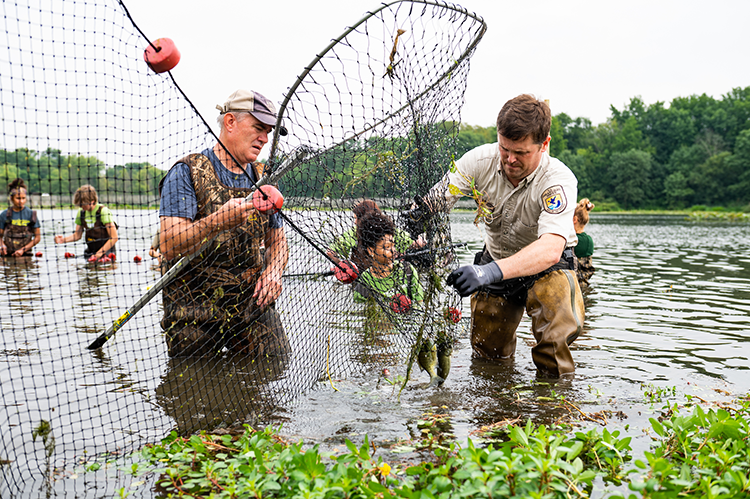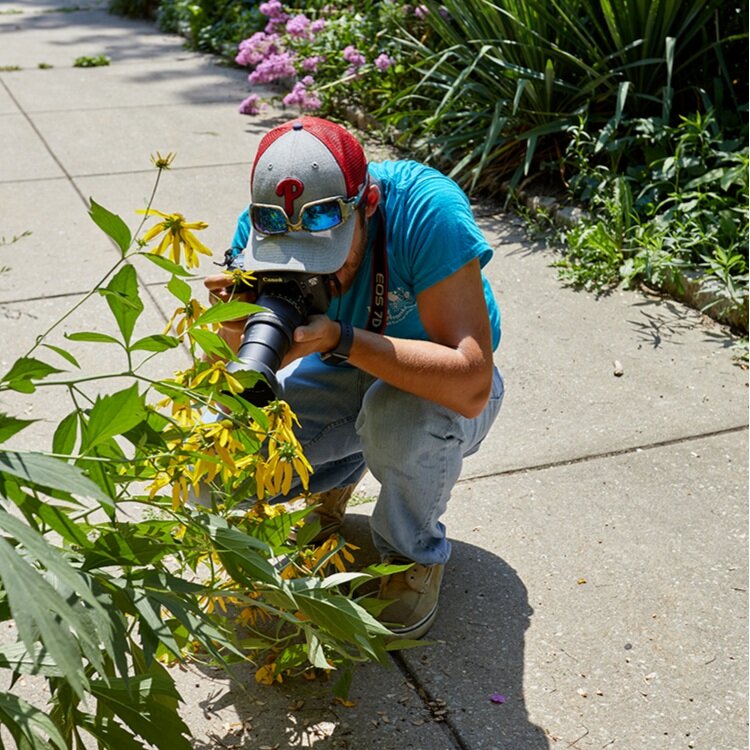In the lower underbellies of BOK, a 340,000 square-foot co-maker space in South Philly, there is a labyrinth of glass—walls of emerald greens and blues, and shelf after shelf of clear jars, beer and soda bottles.
The glass is all empty, pre-used, awaiting its new future wherein Bottle Underground, the one and only glass collection and sorting facility in the city of Philadelphia, will either find a way to put it into recirculation or turn it into molten glass.
The woman-led nonprofit is working to close the glass loop in Philadelphia, where 70% of disposed glass ends up in landfills. The co-owners, Danielle Ruttenberg and couple Rebecca Davies and Mark Ellis, started the operation in 2020, but they had already been working together for years after meeting in 2002 in the glass program of Temple University’s Tyler School of Art and Architecture. Their glass and fabrication work prompted conversations about the possibilities of using bottle glass, a notoriously difficult medium from a glassblowing perspective, as a material.
Years later, in 2016, the women founded Remark Glass, which focuses on making high-end creative design crafts out of bottle glass. Ruttenberg says it became increasingly apparent that their small artisan glass business simply couldn’t turn every delivery of growlers and wine bottles into hand-blown cups or lighting fixtures. So, they started brainstorming ways to handle the surplus and Bottle Underground was born.
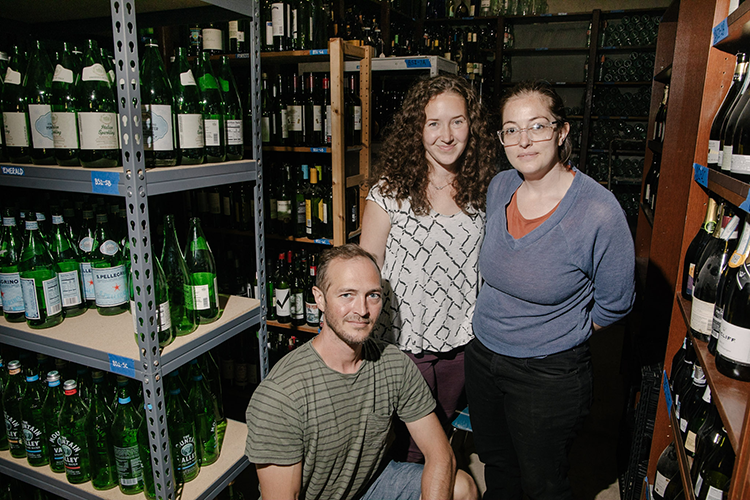
Though they have the same owners, Remark reinvents materials, while Bottle Underground is strictly focused on reducing glass waste, says Ruttenberg, and finding the best method to reuse that material, whether through down cycling, recycling, re-circulation, re-blowing and transforming, or selling to Remark or other partners.
No glass item was made to be single use, and glass is an infinitely recyclable material.
“This is a perfectly fine jar,” says Ruttenberg of one of Bottle Underground’s wares. “It doesn’t need to be changed. And it doesn’t need to be trash either.”
But due to contamination and lack of sophisticated recycling processes, most disposed glass in the United States ends up in landfills, where it can take a million (or more) years to decompose.
According to the Environmental Protection Agency’s most recently collected data, 7.8 million tons of glass went into the landfills in 2018, meaning only about one-fifth of the 10 million tons of disposed glass was recycled.
“I truly believe that the work we are doing here can transform the glass recycling industry in the Philadelphia area.”
— Kate Duffy, Bottle Underground volunteer
If it’s not cleaned properly it can’t be reused, explains Ruttenberg, and when the recyclables in the bin commingle and glass breaks it becomes even less viable. The archaic single-stream system isn’t working, and the infinite potential of glass has been lost, but Bottle Underground is attempting to change that.
Ruttenberg says the company’s goals are big, because the ability to scale and branch its model to other communities is seamless. In the immediate future they hope to expand their partnerships and streamline their collection processes, but ultimately their Holy Grail is to upend the current recycling system and change the way consumers think about glass.
“There’s so much potential here,” says Ruttenberg. “It’s an international problem with a very localized solution.”
The name Bottle Underground came from the original BOK blueprints, where the storage space was named “BU.” While she doesn’t know what the original BU stood for, Ruttenberg says she and her co-owners began jokingly referring to it as “Bottle Underground,” and then realized how appropriate the name was for the endeavor.
“The way that this organization is growing as a network [and] has an underground feel—this expanding web—expanding beyond what is currently accepted as the standard of recycling,” she says.
Starting a new business several months before the COVID-19 outbreak was a dealbreaker for lots of startups, but for Bottle Underground, the pandemic only emphasized the need for better glass collection.
“The pandemic highlighted a stronger sense of care for our environment,” Ruttenberg says. “The pandemic told us we needed to do this.”
As the trash and recycling crisis came into full view, it felt like time to offer a solution, says Ruttenberg. Without any advertising, Bottle Underground went from receiving hundreds of pounds of glass per month, to three to six tons.
With the help of a modest full-time staff and volunteers, the entire operation, from drop off to re-circulation, happens at the Bottle Underground facility. “We are working in a bootstrap way, we didn’t have money to do this for hire,” says Ruttenberg. “We’re doing this in addition to Remark.”
Zaid Farid, the full-time office coordinator, handles all of the glass intake and inventory, both for Remark and Bottle Underground. Farid says he feels a sense of purpose working with the company.
“It’s one of the main things that brought me in,” he says, adding that he’s worked a lot of different jobs, and finding one that is meaningful is hard to come by.
When a drop-off occurs at the Mifflin Street dock, Farid does a full intake of the pieces—weighing, cleaning and sorting. Whole clean glass containers are requested, and certain colors—blues and greens—as well as uniquely textured bottles are preferred to keep a balanced stock, but the team won’t turn any glass away. Anything that is broken or crushed goes to the kiln, where it’s melted into a single color block and stored for future use, says Farid.
If there is a large amount of surplus, they are able to ship it to another facility, but it has to meet a certain tonnage requirement, which takes a while. Until then, Bottle Underground will store it.
“There’s a lot of human labor involved in everything that comes through the door,” says Ruttenberg. And most of that labor is done by volunteers, she adds.
One of their consistent volunteers is Kate Duffy, a human relations manager living in South Philly who says working with Bottle Underground is her “passion project.” She was at first a local customer who brought her glass to several drop offs.
“Every interaction I had I felt like I connected on our shared interest in the reduction of waste and our impact on the environment,” she says. “The company mission got me there, but the people pulled me in.”
She began volunteering several days a week earlier this year, and is now focusing on getting the volunteer program up and running. On Saturdays they hold volunteer events, which Duffy says are extremely rewarding for her, as she gets to interact with like-minded community members.
“Through my interactions with the individuals who come to our drop off hours alone, we see this desire for an alternative to the current recycling system,” says Duffy. “It’s not working and the community knows it.”
She says people will drive an hour just to bring their used glass to a drop off, because they know it’s the only way it will be truly recycled. Duffy believes that the business and community partnerships that the Bottle Underground team have established is proof that local consumers want to buy a product that they know has been given a second life.
“I think this is just the beginning,” she says. “I truly believe that the work we are doing here can transform the glass recycling industry in the Philadelphia area.”
Though she often feels daunted by the need to fundraise and get support, as well as the ins and outs of running a nonprofit, Ruttenberg says she’s very excited about the operation and the opportunity to show corporate America a prototype for better recycling.
“At the end of the day I think we’re ahead of the curve in highlighting these ways that glass can be so beneficial and such a highly-valued resource instead of a waste material,” she says.
She says she sees a million ways to streamline the process, with the proper funding, from a tracking app, to a drop-off station where people can weigh and deposit their own glass.
“There’s a lot of energy in terms of creating these creative solutions for recycled content,” she says. “My vision is big—it’s really big.”


